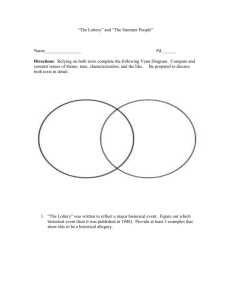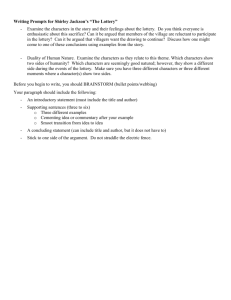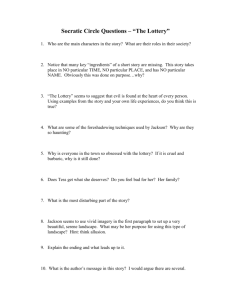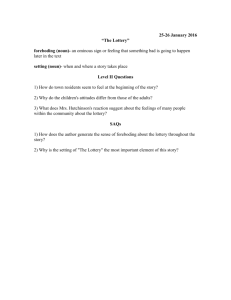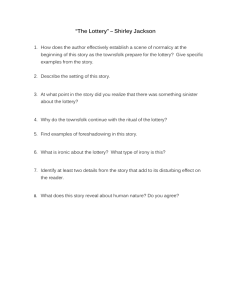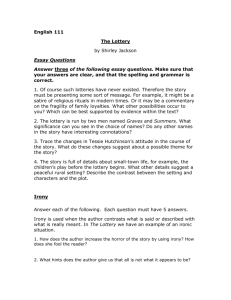Lottery Tax Rates Vary Greatly By State
advertisement
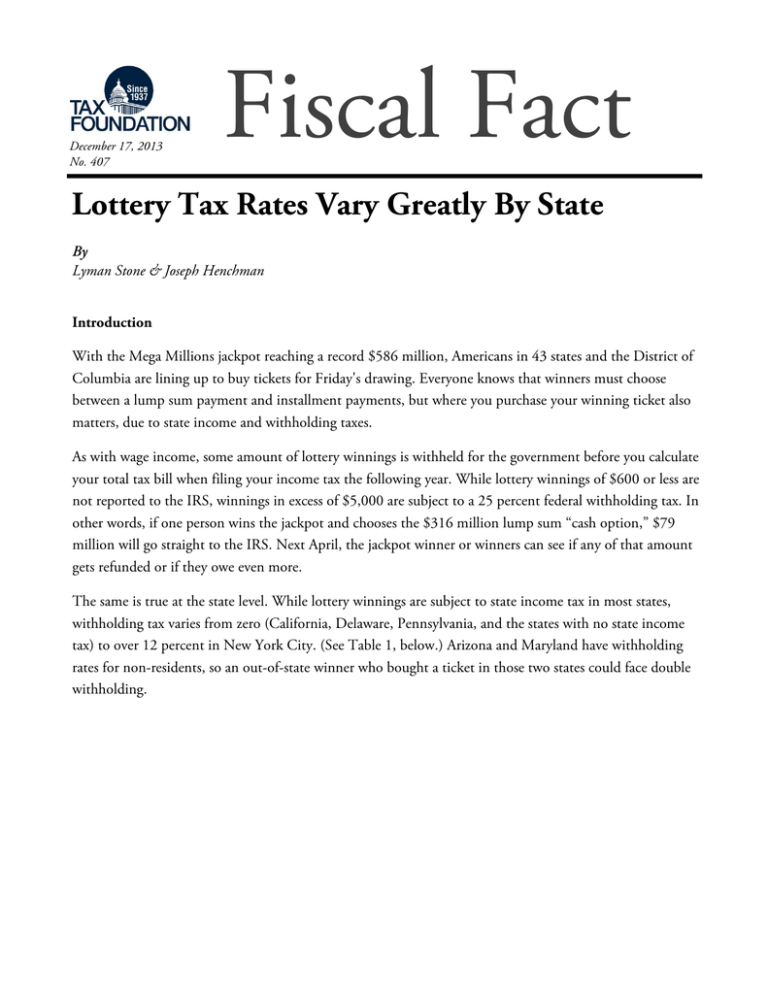
December 17, 2013 No. 407 Fiscal Fact Lottery Tax Rates Vary Greatly By State By Lyman Stone & Joseph Henchman Introduction With the Mega Millions jackpot reaching a record $586 million, Americans in 43 states and the District of Columbia are lining up to buy tickets for Friday's drawing. Everyone knows that winners must choose between a lump sum payment and installment payments, but where you purchase your winning ticket also matters, due to state income and withholding taxes. As with wage income, some amount of lottery winnings is withheld for the government before you calculate your total tax bill when filing your income tax the following year. While lottery winnings of $600 or less are not reported to the IRS, winnings in excess of $5,000 are subject to a 25 percent federal withholding tax. In other words, if one person wins the jackpot and chooses the $316 million lump sum “cash option,” $79 million will go straight to the IRS. Next April, the jackpot winner or winners can see if any of that amount gets refunded or if they owe even more. The same is true at the state level. While lottery winnings are subject to state income tax in most states, withholding tax varies from zero (California, Delaware, Pennsylvania, and the states with no state income tax) to over 12 percent in New York City. (See Table 1, below.) Arizona and Maryland have withholding rates for non-residents, so an out-of-state winner who bought a ticket in those two states could face double withholding. Tax Foundation Fiscal Fact No. 407 December 17, 2013 Table 1: Lottery Withholding Tax Rates by State State Alabama Alaska Arizona Arkansas California Colorado Connecticut Delaware Florida Georgia Hawaii Idaho Illinois Indiana Iowa Kansas Kentucky Louisiana Maine Maryland Withholding Tax Rate (%) No lottery No lottery 5.0% (residents); 6.0% (non-residents) 7.00% None 4.00% 6.70% None No income tax 6.00% No lottery 7.80% 5.00% 3.40% 5.00% 5.00% 6.00% 5.00% 5.00% 8.75% residents; 7.00% non-residents Massachusetts 5.00% Michigan 4.35% Minnesota 7.25% Mississippi No lottery Missouri 4.00% State Withholding Tax Rate (%) Montana Nebraska Nevada New Hampshire New Jersey New Mexico New York North Carolina North Dakota Ohio Oklahoma Oregon Pennsylvania Rhode Island South Carolina South Dakota Tennessee Texas Utah Vermont Virginia 6.90% 5.00% No lottery No income tax 3.00% 6.00% 8.82% (plus 3.648% for New York City or 0.897% for Yonkers) 7.00% 3.99% 4.00% 4.00% 8.00% None 7.00% 7.00% No income tax No income tax No income tax No lottery 6.00% 4.00% Washington West Virginia Wisconsin Wyoming District of Columbia No income tax 6.50% 7.75% No lottery 8.50% States rely heavily on lottery revenue, collecting an average of $59 per person in profit aside from any income tax collections. (See Table 2, below.) While no government labels its lottery as a tax, lottery profits are an implicit tax. After prizes have been awarded and operating costs have been covered, the remaining money is transferred to state coffers. To the extent this revenue is used for general government purposes, it is a tax. Further, because state lotteries pay out an average of only 60 percent of gross revenues in prizes (compared to about 90 percent for casino slot machines or table games), state-run lotteries are only viable as a monopoly, in conjunction with a ban on private lotteries. Some argue that while it is a tax, it is a voluntary one since the revenue is handed over to the government enthusiastically. But this argument confuses the purchase of a product with the payment of the tax on the product. While it is true that the purchase of the product is voluntary, the tax portion of the ticket price is 2 Tax Foundation Fiscal Fact No. 407 December 17, 2013 not, just as a sales tax is compulsory on the purchase of clothing or books. The voluntary nature of the purchase does not make the tax any less of a tax. Table 2: State Implicit Lottery Tax Revenue Per Capita, Fiscal Year 2011 State U.S. Average Alabama Alaska Arizona Arkansas California Colorado Connecticut Delaware Florida Georgia Hawaii Idaho Illinois Indiana Iowa Kansas Kentucky Louisiana Maine Maryland Massachusetts Michigan Minnesota Mississippi Missouri Implicit Tax Revenue Per Capita $59 No Lottery No Lottery $22 $32 $36 $22 $83 $361 $63 $87 No Lottery $23 $52 $30 $24 $23 $49 $30 $38 $80 $133 $71 $23 No Lottery $50 Rank 37 28 27 38 10 1 16 9 34 19 31 33 35 22 30 26 11 6 12 36 21 State Implicit Tax Revenue Per Capita Montana $11 Nebraska $17 Nevada $17 New Hampshire No Lottery New Jersey $47 New Mexico $106 New York $20 North Carolina $139 North Dakota $46 Ohio $9 Oklahoma $65 Oregon $24 Pennsylvania $144 Rhode Island $69 South Carolina $339 South Dakota $58 Tennessee $130 Texas $70 Utah $40 Vermont No Lottery Virginia $50 Washington $55 West Virginia $20 Wisconsin $316 Wyoming $31 Rank 42 41 41 23 8 40 5 24 43 15 32 4 14 2 17 7 13 25 20 18 39 3 29 Note: The implicit tax revenue is the portion of lottery revenue kept by the state, or the "profit." It does not include federal or state income tax on winnings. Source: U.S. Census Bureau, Tax Foundation calculations. 3 Tax Foundation Fiscal Fact No. 407 ©2013 Tax Foundation National Press Building 529 14th Street, N.W., Suite 420 Washington, DC 20045 202.464.6200 www.TaxFoundation.org December 17, 2013 About the Tax Foundation Since 1937, the Tax Foundation has advocated for smarter tax policy. For decades, we have led the debate on sound tax policy through education, expert analysis, and engagement with citizens, policymakers, and journalists. 4
